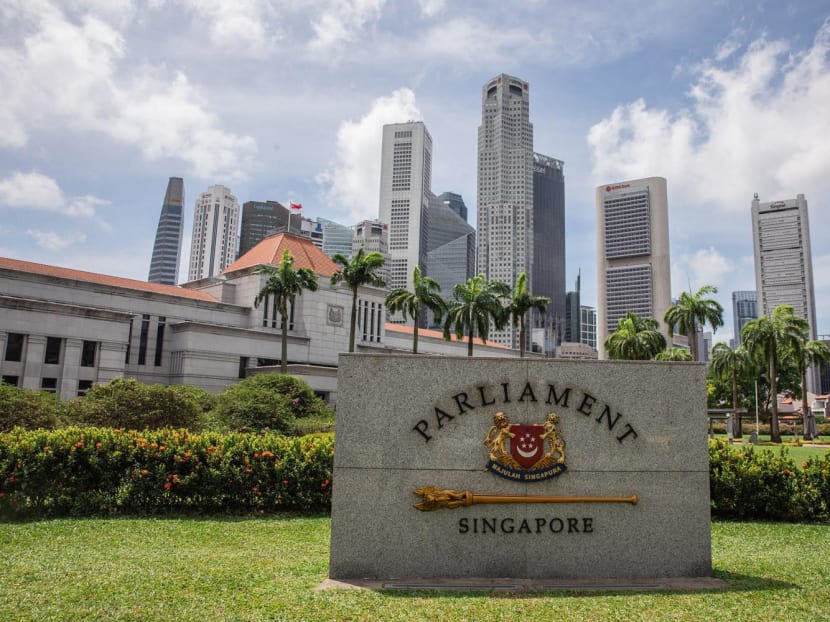Parliament in brief: Topics discussed include HDB buying back units, Thomson-East Coast Line disruption and hawkers leaving trade
SINGAPORE — The Housing and Development Board (HDB) bought back four flats in 2022 from owners who faced difficulties selling their flats due to constraints they faced under the Ethnic Integration Policy (EIP).

A view of the Parliament House.
- The authorities bought back four flats in 2022 from owners who faced difficulties selling them due to constraints they face under the Ethnic Integration Policy
- This was in a response by National Development Minister Desmond Lee to an MP's question on March 20
- Another MP asked about the disruptions on the MRT network's Thomson-East Coast Line
SINGAPORE — The Housing and Development Board (HDB) bought back four flats in 2022 from owners who faced difficulties selling their flats due to constraints they faced under the Ethnic Integration Policy (EIP).
National Development Minister Desmond Lee provided this figure in response to a parliamentary question from Workers' Party's Member of Parliament (MP) He Ting Ru on Monday (March 20).
The Government announced such a buyback scheme in March last year and this is believed to be the first time that it had provided an update on the number of flat owners who have sold their homes back to HDB.
Other topics, such as recent disruptions on the MRT network's Thomson-East Coast Line and the number of hawkers who have exited the industry in 2022, were also raised by MPs during the parliamentary sitting.
1. BUYING BACK UNITS FROM FLAT OWNERS CONSTRAINED BY EIP
Questions by Ms He Ting Ru, MP for Sengkang Group Representation Constituency (GRC)
- Since the introduction of the scheme to buy back HDB flats from eligible EIP-constrained flat owners who had difficulty selling their flats, how many applications have been received?
- The breakdown of applications by ethnic groups
- How many flats have been successfully sold back to HDB?
Reply by National Development Minister Desmond Lee
HDB received 411 EIP-related appeals in 2022, with 131 of these being acceded to, or 32 per cent of the appeals received.
Four of the successful appeals were assisted through the buyback assistance scheme.
"Most of the remaining cases were ineligible as the flat owners did not make regular attempts to sell their flats over a continuous period or had yet to own their flats for at least 10 years," Mr Lee said.
Under the scheme, owners have to have owned the flat for at least 10 years and marketed their flat for at least six months at a reasonable price, among other considerations.
EIP was introduced in 1989 to ensure that there is a mix of the various ethnic communities in HDB estates.
The percentage of approved appeals has been increasing for the past few years, based on past parliamentary replies by the Ministry of National Development.
It went up from 8 per cent in 2017 to 14 per cent in 2018, and then 18 per cent in 2019 and 21 per cent in 2020.
From 2017 to 2019, the number of appeals had ranged from 530 to 630 each year.
In terms of ethnic group breakdown of the appeals received in 2022, Mr Lee said on Monday that 14 per cent of the appeals came from the Chinese ethnic group, 25 per cent from the Malays and 61 per cent from the Indian or “others” ethnic groups.
He reiterated that that HDB provides various measures to help flat owners who face genuine difficulties in selling their flats when the EIP quotas have been reached.
Such measures include giving them more time to sell their current flat if they have bought another or waiving the EIP limits in exceptional circumstances to allow them to sell their flat to buyers from any ethnic group.
“In cases where waiving the EIP limit may lead to further imbalances in the proportion of the various ethnic groups in blocks or neighbourhoods, HDB may consider buying back flats from eligible EIP-constrained flat owners,” Mr Lee said.
HDB will continue to extend assistance measures to those who are genuinely facing difficulties selling their flat when EIP quotas have been reached, he added.
2. DISRUPTIONS TO TRAIN SERVICES ON THOMSON-EAST COAST LINE
Questions by Mr Melvin Yong, MP for Radin Mas
- Since the opening of the Thomson-East Coast Line Stage 3 on Nov 13, 2022, how many disruptions to regular train services has the line experienced?
- What are the underlying reasons behind the disruptions?
Reply by Transport Minister S Iswaran
There have been four train-related faults that caused delays of more than five minutes, and one instance in which trains had to travel slower due to signalling fault.
“Three of these faults were due to hardware malfunction, and the relevant components have since been replaced. The remaining two were due to software issues and have since been addressed,” he added without elaborating.
Detailed investigations are still ongoing to identify the root causes of the malfunctions.
Mr Iswaran said that the Land Transport Authority and rail operators conduct extensive testing to minimise risks of service disruption, but certain issues may only surface during the early phases of full-scale operation before the system stabilises.
He urged commuters to be understanding and patient in such instances.
On March 7, a train fault caused an added travelling time of 25 minutes along the Thomson-East Coast Line during the evening rush hour.
During the incident, train operator SMRT had to provide bridging bus services to divert the commuters.
The disruption lasted nearly three hours.
This came after two disruptions four days apart in February that caused extra travelling times of 10 to 20 minutes.
3. NUMBER OF HAWKERS LEAVING TRADE, IMPACT OF INFLATION
Questions by Mr Leon Perera, MP for Aljunied GRC
- In 2022, how many hawkers exited from the industry?
- What has been the impact of inflation in past year on these affected hawkers?
Reply by Ms Grace Fu, Minister for Sustainability and the Environment
There were 342 cooked food stall tenancy terminations in hawker centres managed by the National Environment Agency (NEA) or its appointed agents.
“This works out to an average of 29 terminations a month, which is comparable to the monthly average of 30 terminations between 2017 and 2019 prior to the Covid-19 years,” Ms Fu said.
The vacancy rates at hawker centres managed by NEA or its appointed operators have also "remained low and stable".
A study released last week found that despite the rising costs of operating a food stall in hawker centres, food courts and kopitiams, many stall owners did not raise prices between late last year and early this year.








